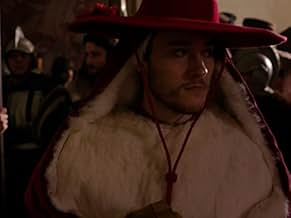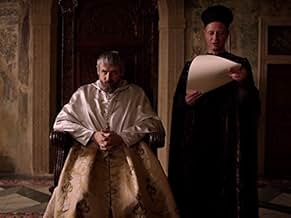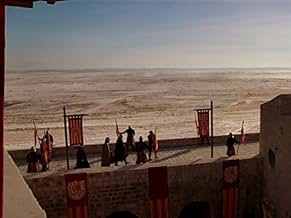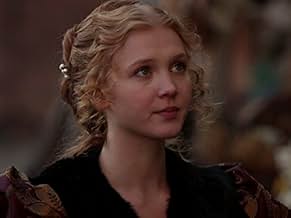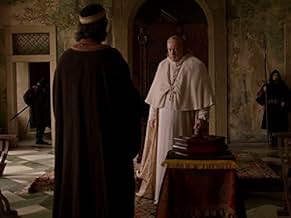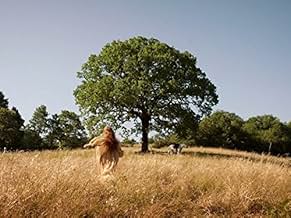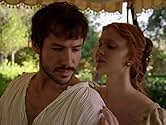Story of the rise and the fall of the Renaissance dynasty.Story of the rise and the fall of the Renaissance dynasty.Story of the rise and the fall of the Renaissance dynasty.
- Awards
- 2 wins & 8 nominations total
Browse episodes
Featured reviews
Give it a chance! This show takes some getting used to (especially if you come after more lavish Showtime production). The first few episodes are heavy with exposition, the mishmash of accents can be jarring and the young Borgia are immature and not very likable. However, it quickly becomes obvious that this is done on purpose: after all, the brothers, Cesare and Juan, are still hot-headed teenagers eager to prove themselves while Lucrezia is just a child. During the course of two seasons, through trials and tribulations, they grow and mature, and Cesare is very believable as a flawed character with conflicting motivations, and the force to be reckoned with, just like his legend suggests. Cesare and Lucrezia not only do they look like their portraits, they are doing a terrific job bring their complex characters to life.
Other cast is superb, too, even Doman, who might lack Irons' expressive voice but brings commanding presence necessary for the most influential man in the Christian world. All in all, the character development is one of the best I've seen on TV (worthy of anything on HBO), even the minor characters seem like real people with their own agendas rather than just the talking heads. This show is also truer to showing life and times: St. Peter is run down, just like it was, in all the night scenes it actually looks like the world lit only by fire.
As far as historical accuracy goes: remember, most of the dark deeds attributed to Borgias are due to the smear campaign of their enemies. I doubt that the real Borgia were really much worse than any other noble family squabbling over Italy at the time. I think Fontana successfully combines some of the legend with the actual historical events, not without some dramatic license, as expected. There's a wealth of details that makes Showtime's show look like Dallas in period costumes. After a somewhat shaky start, it became my favorite adult historic show since Rome.
Other cast is superb, too, even Doman, who might lack Irons' expressive voice but brings commanding presence necessary for the most influential man in the Christian world. All in all, the character development is one of the best I've seen on TV (worthy of anything on HBO), even the minor characters seem like real people with their own agendas rather than just the talking heads. This show is also truer to showing life and times: St. Peter is run down, just like it was, in all the night scenes it actually looks like the world lit only by fire.
As far as historical accuracy goes: remember, most of the dark deeds attributed to Borgias are due to the smear campaign of their enemies. I doubt that the real Borgia were really much worse than any other noble family squabbling over Italy at the time. I think Fontana successfully combines some of the legend with the actual historical events, not without some dramatic license, as expected. There's a wealth of details that makes Showtime's show look like Dallas in period costumes. After a somewhat shaky start, it became my favorite adult historic show since Rome.
For a TV series, this is an excellent one. I agree with the reviewers who say that it is reminiscent of Rome. There is much more passion than in the Showtime series Borgias. The female characters are stunning. The interpretation of Lucrezia is exceptional as the actress shows all the naivety and emotion of the girl's young age but also her growing awareness of her power. The actress who played Julia was also stellar. If there is any criticism, I just wish that the writers had focused more on the women and the relationships, as this is where the show shines. I thought that Donan plays well as Rodrigo. Much better than Jeremy Irons because Irons was just plain creepy. Donan has an aura that makes it more plausible that people would agree to support him (and that so many women would fall in love with him). The depictions of Juan and Chesare are weaker. I thought that reflected more on the writing than on the actors. Jaun's appearance kind of bugged me, as I kept thinking of him as a modern Frat boy. The actor who played Chesare, if his colouring was darker, looked exactly like the famous painting of the real one! I disagree with the reviewer who quibbled about the CGI backgrounds. I thought the painting- like effect was an effective nod to the artists of the time. I found myself getting confused by all the politics but that's okay. Its a good excuse to watch it again! On a final note. It was great to see John Bradley again! I hope he gets more screen time in his next TV series or movie. I love watching that guy!
Feels like a cousin to the shows Rome and that Blood and Sand gladiator series. Historical drama with an extra helping of violence and sex!
Like others I was a bit dismayed at hearing a NY accent surrounded by European accents by all other characters. However, after 2 episodes I didn't even notice. The role of Rodrigo was not a perfect casting, but not far off the mark.
It plays as a man between the cloth, love, ambition, and inadequacy. This is not the tragic Shakespearean archetype, but more of an Everyman struggling with life and politics in his 50s. He wants to do good, but got to where he is by doing whatever he could - good or bad. The occasional screams or fist pumps work well to illustrate the point, in my opinion.
The rest of the cast were fine with a beautiful Lolitaesque Lucrecia being a highlight. I would have proffered a more Latin looking Cesare but the actor was not horrible all said and done.
Lastly for fans of Assassins Creed video game, it's amazing to see Rome look remarkably close to the game. From the houses to the costumes, to the hills. In a scene where Cecere scales Castel Sant Angelo - it was déjà vu!
Like others I was a bit dismayed at hearing a NY accent surrounded by European accents by all other characters. However, after 2 episodes I didn't even notice. The role of Rodrigo was not a perfect casting, but not far off the mark.
It plays as a man between the cloth, love, ambition, and inadequacy. This is not the tragic Shakespearean archetype, but more of an Everyman struggling with life and politics in his 50s. He wants to do good, but got to where he is by doing whatever he could - good or bad. The occasional screams or fist pumps work well to illustrate the point, in my opinion.
The rest of the cast were fine with a beautiful Lolitaesque Lucrecia being a highlight. I would have proffered a more Latin looking Cesare but the actor was not horrible all said and done.
Lastly for fans of Assassins Creed video game, it's amazing to see Rome look remarkably close to the game. From the houses to the costumes, to the hills. In a scene where Cecere scales Castel Sant Angelo - it was déjà vu!
10mjahnl
I read reviews complaining about the historical accuracy and actor's accents. Keep the following in mind:
If I wanted to watch a show based on historical facts, produced with utmost accuracy, I'd watch a documentary. Borgia has a historical base, but otherwise, it is just a dramatical account of a time period. Credit to the film crew, though; I do find the majority of the set decorations to blend very well with the storyline, giving the viewer a sense of accuracy.
The actor's accents: I don't have a problem with any accent. If I expected the delivery of each individual's accent based on their historical origin, in keeping with the English spoken at that time, which was also not a world language as it is today, 99% of the viewers wouldn't understand but 25% of the verbal interaction. Frankly, the differences in accents do stand out, but they are not distracting. I rather have an actor stay with his/her natural accent, than pretending to be from somewhere else, and then receiving criticism for their inaccuracies.
The acting abilities: Unless your name is Kevin Spacey (House of Cards) or you're some other high end Hollywood hotshot, I don't expect anyone to deliver Oscar worthy performances. Small inaccuracies are to be expected, especially given that this is a comparatively small production that works on a shoestring budget. Hollywood has deeper coffers and more A-listers. A few things do stand out, though: Doman's portrayal of Pope Alexander is well done. A man caught up in his own desire to rise above and finding the ability to do so at all cost. He is caught between being a man, while having to be a pope. Who wouldn't struggle? He does well, just as long as he doesn't have to reach too deep into the character tool chest, and draw from deep emotions. He plays the sexual deviant better than the irate villain, and the irate villain better than a person who finds his own physical limitations. (You'll get what I mean, once you see it)
Ryder's performance on Cesare is rather consistent. He's consistently acting well, especially when the performance comes to showing the higher-than-though attitude. He's also consistently overly dramatic when it comes to displaying deep rooted anger. Overall, I think he does well, and I'm having fun watching him move through the show.
The ladies are all very well played. However, with the exception of Isolda Dychauk (Lucrezia), none of the female cast has to reach too deep into the emotional side of acting. Dychauk is a pleasure to watch, though. She's coming across rather believable.
Sex: Being European, I do find it amusing that some of the American viewers get offended by breasts and genitalia. Newsflash, folks. It's human nature. If you don't like to see it, just don't watch the show, or turn your head. I have yet to see an overabundance of skin on this show. The moments when sexual acts were displayed was in keeping with the storyline, and never gave me the impression as if the writers thought: "Well, we're losing momentum here, let's show some breasts...".
Church/Religion: What I find most amusing, is that the Catholic Church is portrayed as corrupt, self serving, political, war mongering, sexually deviant and utterly repulsive; especially when it comes to the matter of portraying itself as pure, innocent and true. Following the books of history, one can only conclude that not much has changed over the centuries. (Side note; by denomination, I am Roman Catholic myself)
Overall, I find Borgia to be quite entertaining and worthy of one's time. Watch it with a grain of salt and don't take the show as a historically accurate account of the people of Rome. However, do watch the show with an underlying interest in inter-Church politics, greed and capitalistic tendencies. Then, transpose your findings onto the church(es) of today. See what your findings are...
If I wanted to watch a show based on historical facts, produced with utmost accuracy, I'd watch a documentary. Borgia has a historical base, but otherwise, it is just a dramatical account of a time period. Credit to the film crew, though; I do find the majority of the set decorations to blend very well with the storyline, giving the viewer a sense of accuracy.
The actor's accents: I don't have a problem with any accent. If I expected the delivery of each individual's accent based on their historical origin, in keeping with the English spoken at that time, which was also not a world language as it is today, 99% of the viewers wouldn't understand but 25% of the verbal interaction. Frankly, the differences in accents do stand out, but they are not distracting. I rather have an actor stay with his/her natural accent, than pretending to be from somewhere else, and then receiving criticism for their inaccuracies.
The acting abilities: Unless your name is Kevin Spacey (House of Cards) or you're some other high end Hollywood hotshot, I don't expect anyone to deliver Oscar worthy performances. Small inaccuracies are to be expected, especially given that this is a comparatively small production that works on a shoestring budget. Hollywood has deeper coffers and more A-listers. A few things do stand out, though: Doman's portrayal of Pope Alexander is well done. A man caught up in his own desire to rise above and finding the ability to do so at all cost. He is caught between being a man, while having to be a pope. Who wouldn't struggle? He does well, just as long as he doesn't have to reach too deep into the character tool chest, and draw from deep emotions. He plays the sexual deviant better than the irate villain, and the irate villain better than a person who finds his own physical limitations. (You'll get what I mean, once you see it)
Ryder's performance on Cesare is rather consistent. He's consistently acting well, especially when the performance comes to showing the higher-than-though attitude. He's also consistently overly dramatic when it comes to displaying deep rooted anger. Overall, I think he does well, and I'm having fun watching him move through the show.
The ladies are all very well played. However, with the exception of Isolda Dychauk (Lucrezia), none of the female cast has to reach too deep into the emotional side of acting. Dychauk is a pleasure to watch, though. She's coming across rather believable.
Sex: Being European, I do find it amusing that some of the American viewers get offended by breasts and genitalia. Newsflash, folks. It's human nature. If you don't like to see it, just don't watch the show, or turn your head. I have yet to see an overabundance of skin on this show. The moments when sexual acts were displayed was in keeping with the storyline, and never gave me the impression as if the writers thought: "Well, we're losing momentum here, let's show some breasts...".
Church/Religion: What I find most amusing, is that the Catholic Church is portrayed as corrupt, self serving, political, war mongering, sexually deviant and utterly repulsive; especially when it comes to the matter of portraying itself as pure, innocent and true. Following the books of history, one can only conclude that not much has changed over the centuries. (Side note; by denomination, I am Roman Catholic myself)
Overall, I find Borgia to be quite entertaining and worthy of one's time. Watch it with a grain of salt and don't take the show as a historically accurate account of the people of Rome. However, do watch the show with an underlying interest in inter-Church politics, greed and capitalistic tendencies. Then, transpose your findings onto the church(es) of today. See what your findings are...
John Doman was a very poor Pope Alexander VI. I cannot call someone a good actor who does not at least try to match the accents of his contemporaries. It was very noticeable.
Other than that, the program is not historically accurate as far as dates go, but that does not matter since it inspires one to look into these events.
Others have said that Mark Ryder overacted, I did not see that. I thought him a very believable & sympathetic Cesare.
I enjoyed this series. Watched it on Netflix and wish I could see more of it. The acting, costumes & locations were lovely. I liked it much more than the Showtime version.
Other than that, the program is not historically accurate as far as dates go, but that does not matter since it inspires one to look into these events.
Others have said that Mark Ryder overacted, I did not see that. I thought him a very believable & sympathetic Cesare.
I enjoyed this series. Watched it on Netflix and wish I could see more of it. The acting, costumes & locations were lovely. I liked it much more than the Showtime version.
Portrayals of the Pope On Screen
Portrayals of the Pope On Screen
Take a look at actors who have portrayed the Pope in movies and on television. And no, we're not going to spoil Conclave if you haven't watched it yet.
Did you know
- TriviaNearly all of the principal actors and actresses were using their natural accents (be they American, Russian, Czech, Italian, et cetera) with a few notable exceptions. Mark Ryder (Cesare Borgia) and Diarmuid Noyes (Alessandro Farnese) are Irish but used English accents on the show. Even Stanley Weber (Juan Borgia) moderates his French accent, though he doesn't sound as English as his on-screen brother. This is because the series was intended for dubbing into non-English European languages (French, German, et cetera).
- GoofsA choke pear (called "Pope's pear") is used to torture a convicted homosexual in the 2nd season. Choke pears were unknown before the 17th century, more than 100 years after the show's time frame. 15th century's punishments for pederasty were not so cruel (penalty, branding).
- ConnectionsReferenced in Vsechnopárty: Episode dated 18 March 2016 (2016)
Details
- Runtime52 minutes
- Color
- Sound mix
- Aspect ratio
- 1.78 : 1
- 16:9 HD
Contribute to this page
Suggest an edit or add missing content






